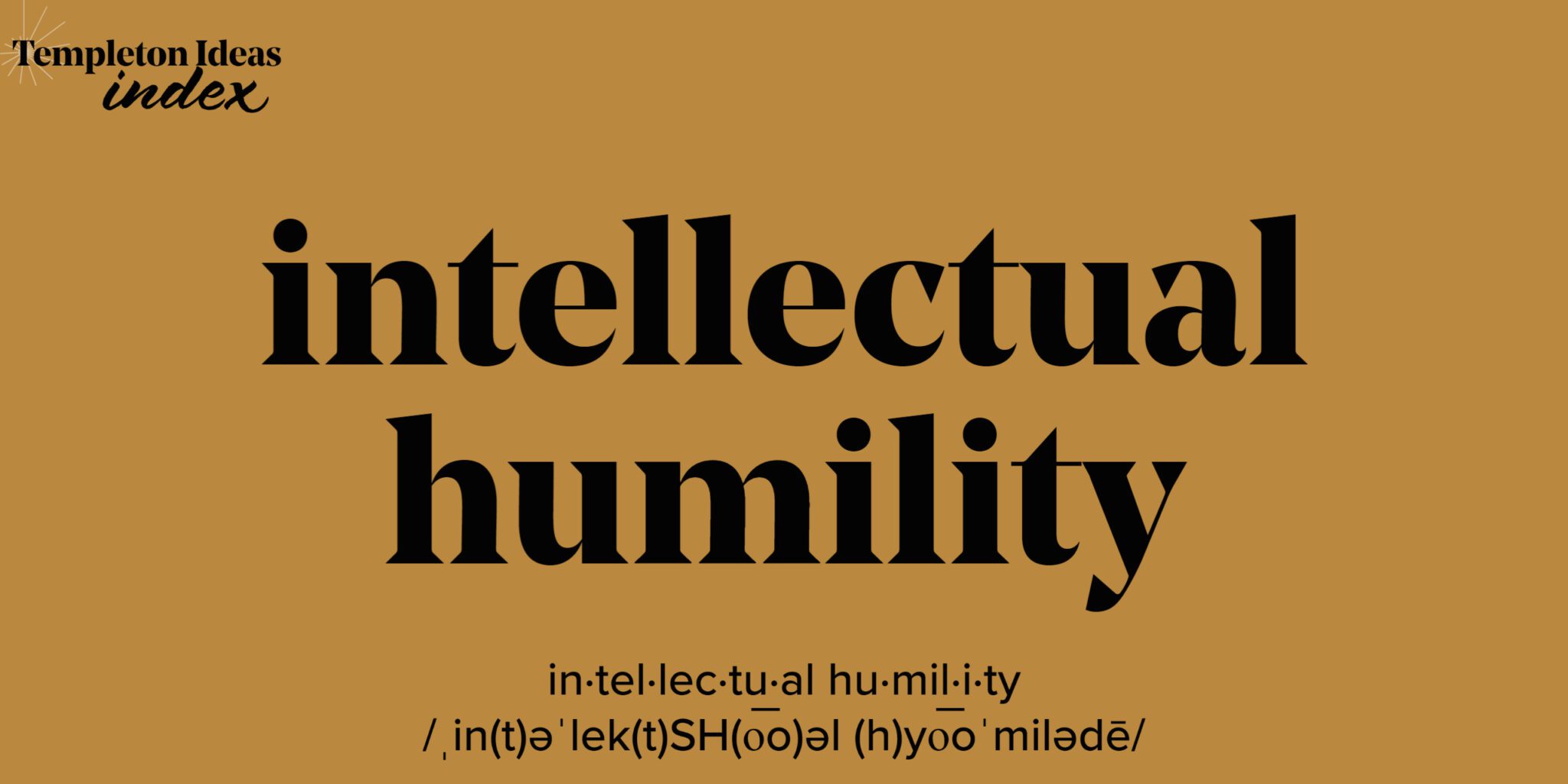Intellectual humility means a willingness to reconsider and expand one’s views, marked by realistic self-assessment and low concern for one’s own self-importance.
It’s a concept that can be described in multiple ways. One group of psychologists recently defined it as “a virtuous balance between intellectual arrogance (overvaluing one’s beliefs) and intellectual diffidence (undervaluing one’s beliefs),” that is “distinct from general humility, modesty, perspective-taking and open-mindedness.” A leading science journalist notes its role in the scientific method and sums it up as “about being actively curious about your blind spots.”
Theorists have treated intellectual humility variously as a personality trait, a cognitive disposition, a set of self-regulatory habits, an intellectual virtue, or simply an absence of intellectual vices.
Some think of it primarily a matter of metacognition (thinking about thinking). Others emphasize its psychological aspects (being tied into our sense of personal security and openness to change) and note how it can be shaped and nudged by situational cues. People can exhibit intellectual humility as a broadly-applied attitude, or in relation to more specific domains or contexts.
Why is intellectual humility important?
In one of the earliest usages of the term in print, an Irish defense attorney in 1805 praised intellectual humility as: “that modesty of mind, without which wisdom cannot exist, and even genius loses much of its lustre.” Many modern researchers have argued that intellectual humility is good for society and good for us, suggesting it improves well-being, enhances tolerance for other perspectives, and promotes inquiry and learning. Part of that likely comes from cultural assumptions about humility more broadly — Saint Augustine famously described humility as the foundation of all other virtues. Others have noted that intellectual humility may also have downsides: one person’s intellectual humility might be another’s paralyzing self-doubt, and under certain circumstances a bit of over-certainty might aid social cohesion.
-

Intellectual Humility. Illustration by Marina Muun.
How do we measure intellectual humility?
Attempting to measure this trait can be, for the researcher, a humbling experience. As with many personality trait measures, gathering self-reports is an obvious place to start. The trait may best be observed by others in certain kinds of situations: during interpersonal conflict, while receiving praise, in hierarchical relationships, or in interactions across different cultures or among those who embrace different norms. One study looked at how people reacted to others changing their minds (specifically so-called “flip-flopping” among political candidates). Recent work using EEGs to measure subjects’ brain activity when they make errors points to potentially less subjective ways of measuring this trait. All told, more than a dozen distinct definitions and ways of measuring Intellectual Humility have been proposed by researchers.
What are the benefits of intellectual humility?
Current research into Intellectual Humility is still in the early stages, and mostly limited to a number of intriguing correlations — including open-minded thinking, empathic concern, emotional diversity, forgiveness of others, perspective-taking, prosociality, seeking compromise, agreeableness, conscientiousness, openness to experience. Some lines of questioning have focused on whether intellectual humility can drive increased tolerance and perspective-taking, both reducing societal conflict and perhaps encouraging epistemic flourishing. Some interventions have built on the body of work showing the ways that general humility can drive prosocial behavior (including a successful workbook intervention shown to increase participants’ general humility).
How can we cultivate intellectual humility?
Depending on one’s views of the sources of intellectual humility, different potential interventions seem promising. If metacognitive ability (thinking about thinking) is a key driver, then interventions could focus on developing thinking skills that enhance it. One proposed intervention suggests that teaching subjects ‘to write and think in ways that align with how humble people write and think’ could increase their intellectual humility. If intellectual humility is mainly related to our degree of personal security, we should tread cautiously with interventions. Emphasizing novel ideas could be perceived as a threat to people’s deeply held values. Finally, there is great opportunity for exploring and testing interventions to cultivate greater individual Intellectual Humility, or to discover situational cues to nudge people towards intellectually humble behavior.
Still Curious?
Read overviews of the science and philosophy of Intellectual Humility from this website, Nature Reviews Psychology, and philosopher and Templeton grantee Nathan Ballantyne.
5 Ways to Encourage Students to Develop Intellectual Humility
Listen to this episode of Philosophy Talk: “How to Humbly Disagree.”
Watch the video “The Joy of Being Wrong.”
Check out a new book Humble by grantee Daryl Van Tongeren
|
If there’s a specific term you’d like to see featured in the Templeton Ideas Index, you can reach out to us at communications@templeton.org |
Key Takeaways
-
Intellectual humility involves willingness to reconsider one’s views, realistic self-assessment, and a low concern for one’s own self-importance.
-
Intellectual humility touches both on how we think and how we feel about our and others’ intellectual approaches.
-
Intellectual humility has been correlated with dozens of positive traits and practices including open-mindedness, empathic concern, forgiveness of others, seeking compromise, conscientiousness, and openness to experience.
-
Many researchers believe intellectual humility’s positive aspects support societal goods like greater tolerance and decreased conflict, and are working to design interventions to help cultivate it.

